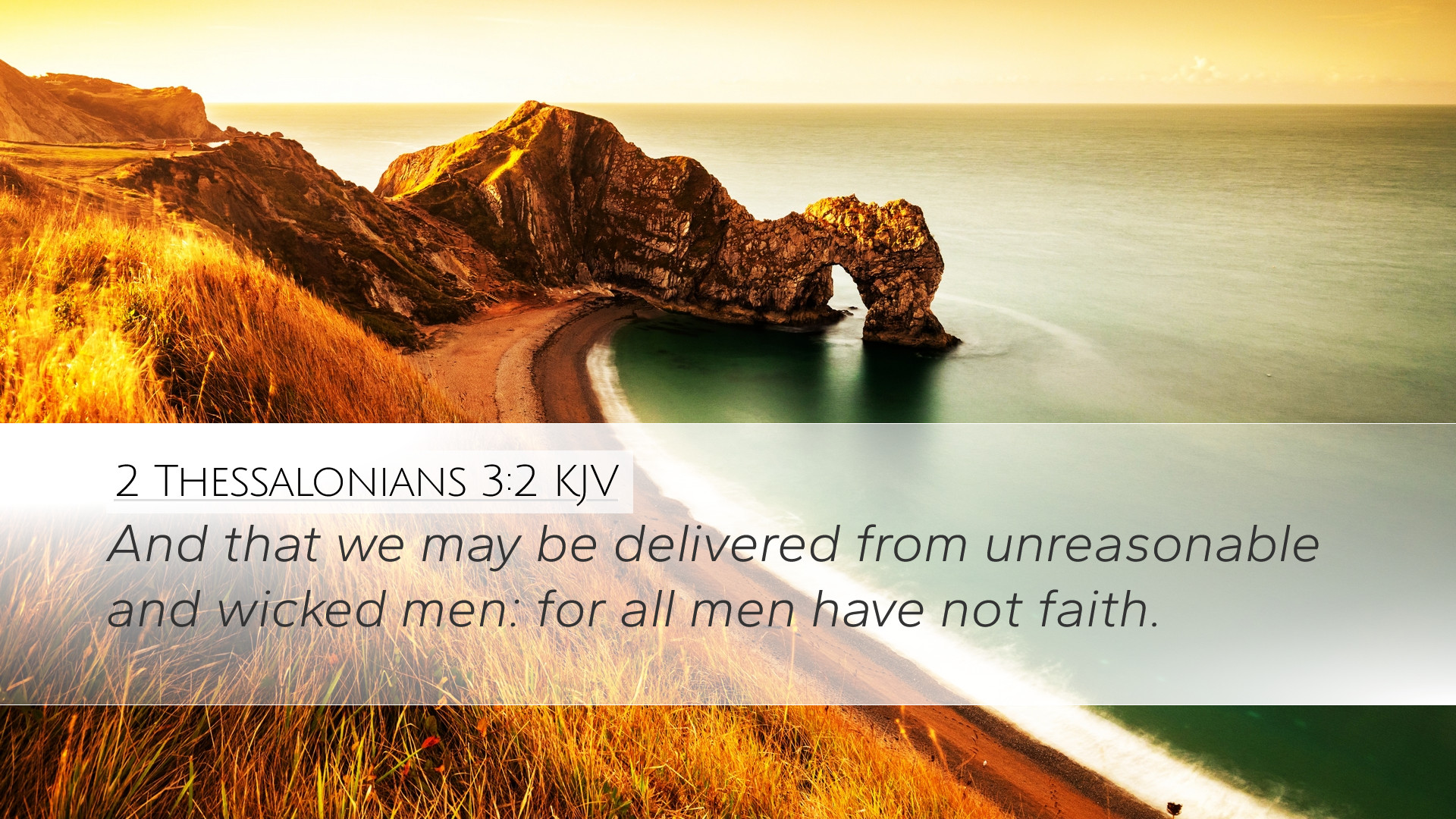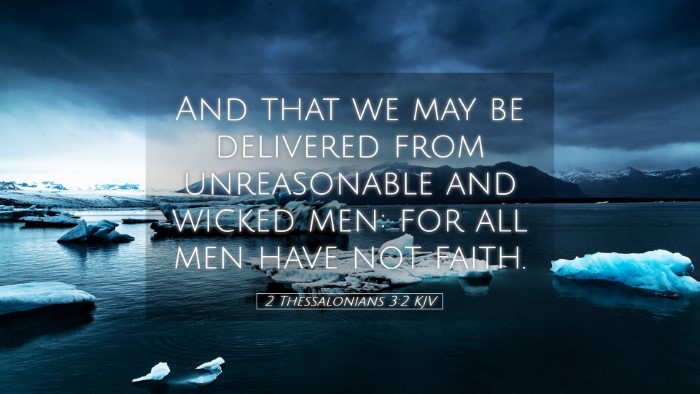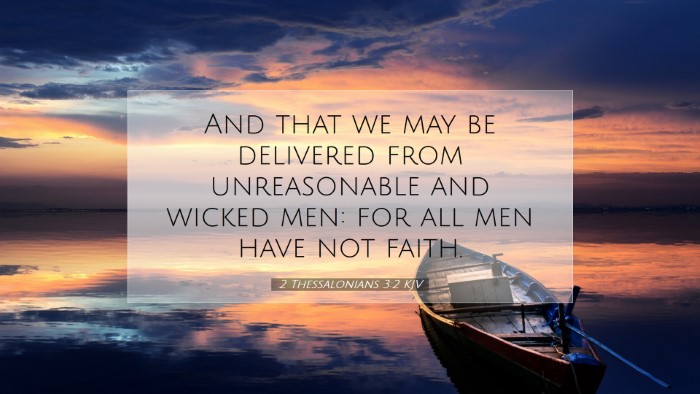Commentary on 2 Thessalonians 3:2
Verse: "And that we may be delivered from unreasonable and wicked men; for all men have not faith."
Introduction
This verse from the Apostle Paul’s second letter to the Thessalonians encapsulates a profound prayer for deliverance from the challenges posed by unruly and wicked individuals. As we delve into the insights of notable commentators such as Matthew Henry, Albert Barnes, and Adam Clarke, we shall explore the spiritual, social, and theological dimensions of this appeal.
Exegesis of the Text
In this petition, Paul expresses his concern for himself and his companions in ministry, emphasizing the reality of opposition that they face. The verse is a succinct expression of the Christian journey fraught with challenges, particularly from those devoid of faith and moral integrity.
Matthew Henry's Insights
“Unreasonable and wicked men” refers to individuals who not only oppose the gospel but also act without moral grounding or reason. Henry posits that such persons are prevalent in the world and often rise against the faithful. He emphasizes that the spiritual fulfillment of the Church necessitates the prayer for protection against these adversaries.
Henry argues that recognizing the existence of wickedness is essential for believers. The church must be vigilant, as the spiritual warfare is real, and being surrounded by "unreasonable" men often insinuates a need for divine intervention. He calls these men “unreasonable” due to their lack of faith and refusal to accept truth, which puts them in direct opposition to God's people.
Albert Barnes on Faith and Its Absence
Barnes elaborates further on the second part of the verse: “for all men have not faith.” He interprets this as a stark contrast between believers and non-believers, confirming that not everyone possesses faith, which leads to inconsistency and opposition. Barnes quotes Paul’s rationale for this prayer, highlighting that faith is the bedrock of moral conduct and ethical behavior. Without it, individuals may resort to irrationality and wickedness.
-
Faithlessness as a Source of Opposition:
Barnes underscores that opposition from men stems from their lack of faith, often leading them to act out of self-interest or malice rather than truth and righteousness. He encourages readers to seek deliverance through prayer, recognizing that reliance on God is crucial in navigating these challenges.
-
The Role of Prayer:
Barnes points out that the mode of deliverance is through prayer. Believers are not to confront wickedness alone; rather, they are imbued with the power of prayer to seek God’s intervention.
Adam Clarke's Perspective
Clarke emphasizes the likely social context of the Thessalonian church under strain. He posits that the phrase "unreasonable and wicked men" may encompass not just outright persecutors but also those who undermine communal cohesion and the faith itself. Clarke nods to the historical context where early Christians often faced skepticism from both Jewish and Gentile communities.
Moreover, Clarke discusses the theme of divine deliverance, asserting that it is a recurrent motif in Paul’s letters. He frames this prayer around God’s sovereignty and the protection He offers to His people:
-
God's Sovereignty:
Clarke affirms that God remains in control, and therefore, this prayer reflects the understanding that human effort is circumscribed by divine will. The acknowledgment that "not all men have faith" makes the need for divine protection evident.
-
The Nature of Opposition:
Clarke adds that true opposition may not always come in blatant forms, but rather through deception and moral ambiguity, making it crucial for believers to be discerning.
Theological Implications
This verse serves as a reminder of the dual realities facing the church: the active engagement in mission alongside an awareness of the opposition that can arise even from within communities. It calls for an understanding of faith as both a gift and a responsibility.
Faith as a Shield
Both Henry and Barnes encourage believers to see faith as a protection mechanism. While the "unreasonable and wicked" may indeed challenge the church, it is faith that provides a foundation for resilience.
Prayer as a Strategic Response
Paul’s request for prayer is underscored across all commentaries. It emphasizes community prayer as essential to counteract the chilling effects of faithlessness in society. Believers must unite in seeking God’s protection against nefarious influences, recognizing that the battle is not merely against flesh and blood but against spiritual wickedness.
Conclusion
In summary, 2 Thessalonians 3:2 is not just a plea for safety but a rich tapestry of insight into the challenges of faith in a tumultuous world. As elucidated by notable commentators, the verse encourages Christians to recognize the dangers posed by “unreasonable and wicked” individuals and to turn fervently to prayer for deliverance. The understanding that all men have not faith reinforces the need for a robust, prayer-dependent community that leans on God’s protection and guidance as it navigates a world not always sympathetic to its principles.


